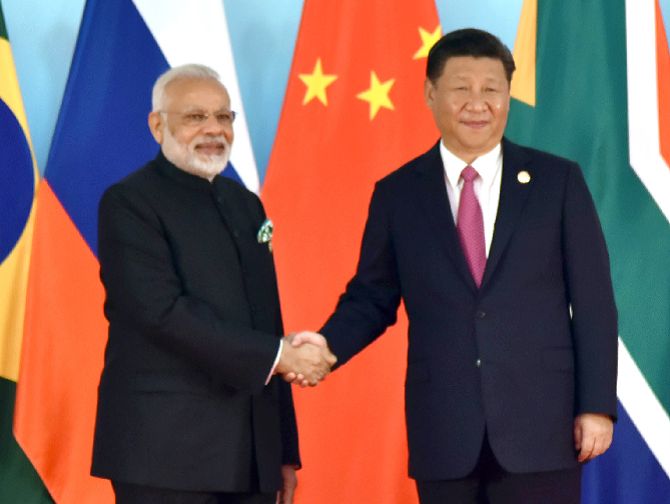 | « Back to article | Print this article |
'It is unrealistic to expect that security dilemmas and strategic distrust to disappear or even diminish any time soon,' says Rup Narayan Das.

The three-day 9th Brazil, Russia, India, China and South Africa (BRICS) summit began in the picturesque Chinese city of Xiamen on Sunday.
After rejigging his council of ministers Prime Minister Narendra D Modi flew to Xiamen to attend the summit. The standoff between the Indian and Chinese border personnel at Doklam was resolved just ahead of the summit, and this facilitated Modi's visit to China.
The BRICS grouping have developed a tradition of holding a slew of meetings at the ministerial level ahead of the summit. Over the years these ministerial meetings have been institutionalised to follow up on agreed action plans.
In addition, the national security advisers of the BRICS countries now meet ahead of the summit. Ajit Doval, India's national security adviser who played a very critical role in resolving the Doklam impasse, met his Chinese counterpart Yang Jichie in Beijing last month.
BRICS was an economic term coined by investment banker Jim O'Neill in 2001 to describe the emerging economies of Brazil, China and India.
O'Neill predicted that the economies of these countries would propel the trajectory of world growth and take the place of the industrialised countries of the West.
In 2003, the predictions were fine tuned in O'Neil's much report which predicted that China's GDP would be $44 trillion, India's 28 trillion by 2050.
The report also forecast that China would be the world's largest economy, India the third largest.
It also prophesised that China would forge ahead of Japan, the second richest economy, by 2015. China replaced Japan and became the world's second largest economy in 2010.
The emerging economies and the formation of BRICS is refection of not only the shifting of geo-politics from the Atlantic to the Asia-Pacific, but also the shifting of the growth engine from the West to the Asia-Pacific.
Although BRICS recognises the primacy of the United Nations system, it questions the efficacy of the architecture of the global economic governance structure and its institutions like the World Bank and the International Monetary Fund.
It argues that these institutions are archaic and do not reflect the shift of the world economy.
It bemoaned the non-implementation of the 2010 IMF reforms which negatively impacts on the IMF's legitimacy, credibility and effectiveness.
BRICS is in favour of making the IMF a quota-based institution. It is also against protectionism which militates against Donald J Trump's advocacy of 'America First'.
These are issues on which there exists convergence of all the BRICS member countries. On the issue of climate change and the Doha Round of trade negotiations, a broad agreement exists between India and China. The two countries are also on the same page with regard to farm subsidies provided by wealthy nations.
The narrative of BRICS is predominantly woven around India and China's developmental trajectory.
Thus, the main denominator of BRICS' success is largely dependent on the strategic trust or lack of it between India and China.
While Russia is slowly recuperating from its sluggish economy and trying to play its global role, Brazil's economy is in a precarious condition after the country overspent on the Rio Olympics.
Political turbulence has also exacerbated the economic backbone of the country. So is the case in South Africa.
It is only India and China whose economies shows signs of resilience in spite of the slight slowing down of their rate of growth and GDP.
Persistent security dilemmas like the Doklam standoff, strategic distrust on China's veto on Pakistan terrorist Masood Azhar, and its opposition to India's application for membership of the Nuclear Suppliers Group, the unsustainable trade deficit between the two countries stymie cooperation between India and China.
The margins of the summit provide very good opportunities for the leaders of the two counties to exchange notes and promote better understanding.
It is unrealistic to expect that security dilemmas and strategic distrust to disappear or even diminish any time soon.
It is in this given situation that India and China should approach their complex relationship through the prism of the Astana Consensus which stressed that differences should be distinguished from disputes.
If BRICS has to be successful, China must co-opt India as an equal partner in the multilateral grouping. One upmanship will not help.
For example, China should facilitate India to play a more decisive role in the BRICS Bank or the New Development Bank. India is the first president of the bank. India should have proper representation in the bank's governance structure.
Terrorism is another recurring theme at BRICS summits. Three of the member countries -- India, Russia, China -- have been victims of terrorism.
The BRICS summit in Xiamen should condemn all forms of terrorism including cross border State sponsored terrorism in one voice.
North Korea's nuclear brinkmanship will come up for discussion and the BRICS leaders need to restrain Pyongyang's nuclear adventurism.
Dr Rup Narayan Das is a Delhi-based foreign policy analyst and former senior fellow at IDSA. The views expressed are personal.
IMAGE: Prime Minister Narendra D Modi is welcomed by Chinese President Xi Jinping at the 9th BRICS summit in Xiamen, September 4, 2017. Photograph: Press Information Bureau